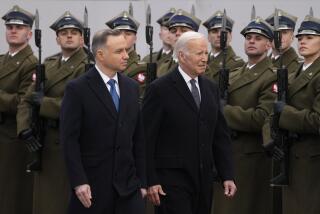U.S. Tells Soviets to Let Poles Solve Problems
- Share via
WASHINGTON — The White House, in a stern pre-summit statement, warned the Soviet Union on Thursday to steer clear of the current labor unrest in Poland and encouraged the Polish government “to begin a productive dialogue with all segments of Polish society, including Solidarity,” to resolve the disputes.
In comments that a White House official said were directed at Moscow, White House spokesman Marlin Fitzwater said “the problems in Poland can only be resolved by the Poles themselves.” At the same time, the State Department raised the prospect that the way the Polish government settles the crisis could affect U.S. economic relations with Warsaw.
On a day in which riot squads violently broke up a strike by steelworkers in southern Poland and police encircled the strikebound Lenin Shipyard in Gdansk, State Department spokesman Charles Redman said the crackdown was “the most dramatic and recent evidence” that the dialogue urged by the United States has not occurred in Poland.
Not Same Significance
But White House officials played down the prospect that the government-labor clash in the Eastern Bloc nation would have an impact on the U.S.-Soviet summit in Moscow scheduled to begin May 29. And officials indicated that they did not attach to the strikes the same significance given to the upheavals that led to Solidarity’s birth in 1980.
Fitzwater told reporters that a dialogue between the government of Gen. Wojciech Jaruzelski and the rest of Polish society “would inspire confidence in economic reform in Poland and in the country’s future. Any resort to repressive measures, and particularly the use of force against peaceful demonstrators, can only have the reverse effect.”
He said the unrest will not be “an obstacle to the summit in terms of doing any significant damage or in obstructing the summit’s progress,” but that it “could well be a point for discussion” between Reagan and Soviet leader Mikhail S. Gorbachev.
The U.S.-Polish economic relationship has only recently been returned to normal after the interruption that followed the imposition of martial law in December, 1981. In the spring of 1987, Poland’s “most-favored nation” trade status was restored, which a State Department official called the last big step “in bringing economic relations back on an even keel.”
That trading status imposes on Polish exports to the United States the same tariff rates applied to exports of the major U.S. allies. Annual two-way trade between the United States and Poland was worth $569 million in 1987.
Economic Credits
In addition, last spring the United States opened the way for Poland to obtain economic credits that had been frozen since the original crackdown on Solidarity--most of which helped Poland pay for grain purchases from the United States.
But even as the State Department raised the possibility that such U.S. economic assistance could be affected, a White House official, speaking on the condition of anonymity, said, “I haven’t heard any suggestion there is any major change on the horizon.”
And, reflecting the sensitivity with which the government views the developments in Poland, he said that if Warsaw gives in to all the strikers’ demands, “it would make it difficult for the government to solve all their economic difficulties.”
“It’s a tough nut to crack,” he said. “Mainly, we’re treading very carefully. We don’t want to stir up the issue and cause more heat and less light.”
Arbatov’s Views
Meanwhile, a senior Soviet official, Georgy A. Arbatov, said in a Washington interview with The Times that the White House warning “is a very easy way to deal with a problem--if you know the other side doesn’t intend to do anything bad, then warn them and take credit” for success.
More to Read
Sign up for Essential California
The most important California stories and recommendations in your inbox every morning.
You may occasionally receive promotional content from the Los Angeles Times.













